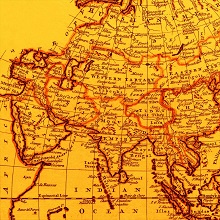From "Gruziya" to "Georgia" - On Georgia and the Georgian Language
January 30, 2017

Hello, I'm Yosshi. I entered the translating business two years ago, dreaming of an international career. Since then, every day I keep discovering more about the ever-fascinating world of translation.
The other day on television, I saw a woman allegedly from Georgia, recount her experience of a recent internal conflict. I was puzzled, because for me, Georgia was a state in the U.S., so her Russian-like features and narrative of internal conflict seemed out of context. So I looked it up, and discovered that "Georgia" was the new name for the country referred to as "Gruziya" in Japanese. Upon doing some more research, I found that Georgia was a relay point between Asia and Europe, and is in the top ten of the World Bank's Ease of Doing Business Index. With my interest piqued, I decided to search more about Georgia and its language.
The Past and Present of Georgia - A Rapidly Improving Platform for Internal and External Business
Georgia is situated next to Russia, and also shares borders with Turkey, Armenia, and Azerbaijan, with its west coast facing the Black Sea. Making use of its advantageous location between Europe and Asia, it is developing as a relay point for cargo trade. It seems that in ancient times, silk from China passed through Georgia while being traded on the Silk Road, and was taken to various regions around the world.
According to the website of the Ministry of Foreign Affairs, Georgia is a small country with a land area one-fifth of Japan's, and has a history of being constantly attacked by surrounding ethnic groups. It achieved independence as a republic in 1991, when the Soviet Union disintegrated. Until quite recently, Georgia was in an unstable situation, with an internal conflict erupting during the 2008 Beijing Olympics, in which Russia intervened. In Japan, the Russian pronunciation "Gruziya" was used to refer to this country. However, in the year after the 2008 military conflict with Russia, the former Georgian government requested to foreign governments that the country's official name be changed from Russian-read "Gruziya" to the English version "Georgia." The Japanese government only adopted this new name in 2015, so the name "Gruziya" is still better known in Japan.
According to a Japanese economic magazine Nikkei Business, the Georgian government had chosen as a political agenda to create an environment that facilitates business for both domestic and foreign companies. As a result, the country achieved considerable progress, coming within the top ten of the Ease of Doing Business Index, as mentioned above.
Facts about Georgia
The Georgian Language
First, according to Gruziya Navi, Georgian belongs to a small language group called the South Caucasus languages. The only other languages in this group are Megrelian, Svan, and Laz which is mainly spoken within Turkey. No wonder it doesn't sound familiar! According to Ambassador Levan Tsintsadze, who spoke in the interview "Nikkei Business: Georgia Aims to be the Logistics Hub for Europe-Japan Trade," the Georgian language came into being when people moved to Europe from Africa, and is one of the 14 oldest languages in the world. The Georgian alphabet stems from Aramaic, which is said to be the language Jesus Christ spoke in. To me, this all just seems like something from a fairy tale.
While researching about Georgian, I saw Georgian letters for the first time. It reminded me of "maru-moji," the round style of Japanese letters that the girls in my class used to write when I was a student. Despite its writing looking somewhat familiar, Georgian has many sounds that do not exist in Japanese, and is said to be one of the most difficult languages for Japanese people to pronounce. A sound that is characteristic of Georgian is what is called the "ejective" in linguistics. It is pronounced by closing the glottis and speaking without releasing your breath, but it seems difficult to even distinguish, never mind pronouncing it.
Information on Business and Communication
According to the Georgia Tourism Information Center of DTAC (Tourism Assistance Center for Developing Countries), in most cases, you can use Russian to communicate with people in Georgia. Additionally, more and more young people can now speak English. Nevertheless, you could get a head start in communicating with Georgian people if you could at least say greetings in Georgian and show some respect towards the language. Also, according to the Georgia Tourism Information Center of DTAC, Georgian people drink a lot when holding dinner parties to welcome their guests, and there are some toasting rules that are unique to Georgian culture. They say there are many specific norms, so at a Georgian dinner party, it seems safe to follow the directions of the "Tamada," the male leader in charge of the dinner. Georgia's famous and traditional "Georgian wine" could be a good theme to keep a conversation going.
Paying Tribute to the Nation's Rich History through the Use of its New Name, "Georgia"
Although Georgia has gone through painful invasions and conflicts, it is now profiting from its geographical location between Asia and Europe, and improving its business environment. With the country's name in Japanese renewed to "Georgia," I hope that interaction between Georgia and Japan will increase even further.
Related Services
| << Lavender: The Reasons Behind the Popularity of Portugal's Floral Emblem | Peony: The Secrets behind China's Symbolic Flower >> |
To Contact Us Regarding Our Translation Services
For urgent needs, call:
+81-3-5730-6133
